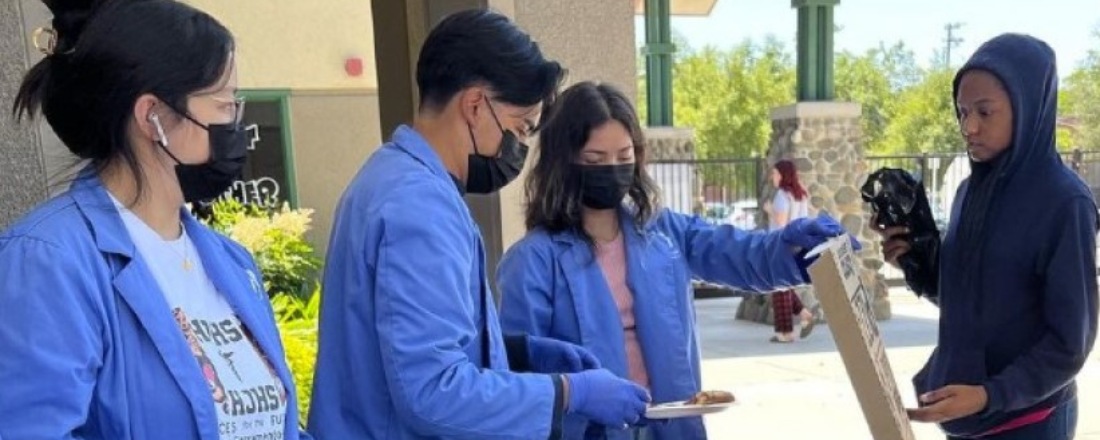
In the News
Latinx Youth Serve as Health Educators to Improve Vaccine Rates in Their Communities
- California Healthline
-
Focus Areas
Healthy Communities -
Expertise
Health Education & Promotion, Outreach & Dissemination -
Programs
FACES for the Future Coalition -
Strategic Initiatives
COVID-19, Vaccine Access & Equity

“Classmates often stop Alma Gallegos as she makes her way down the bustling hallways of Theodore Roosevelt High School in southeast Fresno. The 17-year-old senior is frequently asked by fellow students about covid-19 testing, vaccine safety, and the value of booster shots.
Alma earned her reputation as a trusted source of information through her internship as a junior community health worker. She was among 35 Fresno County students recently trained to discuss how Covid vaccines help prevent serious illness, hospitalization, and death, and to encourage relatives, peers, and community members to stay up to date on their shots, including boosters.
When Alma’s internship drew to a close in October, she and seven teammates assessed their work in a capstone project. The students took pride in being able to share facts about Covid vaccines. Separately, Alma persuaded her family to get vaccinated. She said her relatives, who primarily had received Covid information from Spanish-language news, didn’t believe the risks until one close family friend died.
“It makes you want to learn more about it,” Alma said. “My family is all vaccinated now, but we learned the hard way.”
Community health groups in California and across the country are training teens, many of them Hispanic or Latino, and deputizing them to serve as health educators at school, on social media, and in communities where Covid vaccine fears persist. According to a 2021 survey commissioned by Voto Latino and conducted by Change Research, 51% of unvaccinated Latinos said they didn’t trust the safety of the vaccines. The number jumped to 67% for those whose primary language at home is Spanish. The most common reasons for declining the shot included not trusting that the vaccine will be effective and not trusting the vaccine manufacturers.
And vaccine hesitancy is not prevalent only among the unvaccinated. Although nearly 88% of Hispanic and Latinos have received at least one dose of a Covid vaccine, few report staying up to date on their shots, according to the Centers for Disease Control and Prevention. The CDC estimated fewer than 13% of Hispanics and Latinos have received a bivalent booster, an updated shot that public health officials recommend to protect against newer variants of the virus.
Health providers and advocates believe that young people like Alma are well positioned to help get those vaccination numbers up, particularly when they help navigate the health system for their Spanish-speaking relatives.
It makes sense we should look to our youth as covid educators for their peers and families. And when we’re talking about the Latino community, we have to think deeply and creatively about how to reach them.Dr. Tomás Magaña, PHI’s FACES for the Future
Some training programs use peer-to-peer models on campuses, while others teach teens to fan out into their communities. FACES for the Future Coalition, a public youth corps based in Oakland, is leveraging programs in California, New Mexico, Colorado, and Michigan to turn students into covid vaccine educators. And the Health Information Project in Florida, which trains high school juniors and seniors to teach freshmen about physical and emotional health, integrates covid vaccine safety into its curriculum.
In Fresno, the junior community health worker program, called Promotoritos, adopted the promotora model. Promotoras are non-licensed health workers in Latino communities tasked with guiding people to medical resources and promoting better lifestyle choices. Studies show that promotoras are trusted members of the community, making them uniquely positioned to provide vaccine education and outreach.”
Click on the link below to read the full article.
Related stories
Latino teens are deputized as health educators to sway the unvaccinated/ California Healthline
Entrenan a adolescentes latinos para influenciar a personas no vacunadas contra el COVID/ Los Angeles Times
Latino teens are deputized as health educators to sway the unvaccinated/ CapRadio
Central Valley teens help to boost COVID vaccine rates / The Sacramento Bee (Access via their paywall)
Adolescentes latinos se entrenan para educar sobre las vacunas contra covid / Kaiser Health News
Latino teens Are deputized as health educators to sway the unvaccinated / Kaiser Health News
Latino teens get training to educate people about COVID-19 / Tampa Bay Times
More Updates
Work With Us
You change the world. We do the rest. Explore fiscal sponsorship at PHI.
Support Us
Together, we can accelerate our response to public health’s most critical issues.
Find Employment
Begin your career at the Public Health Institute.



